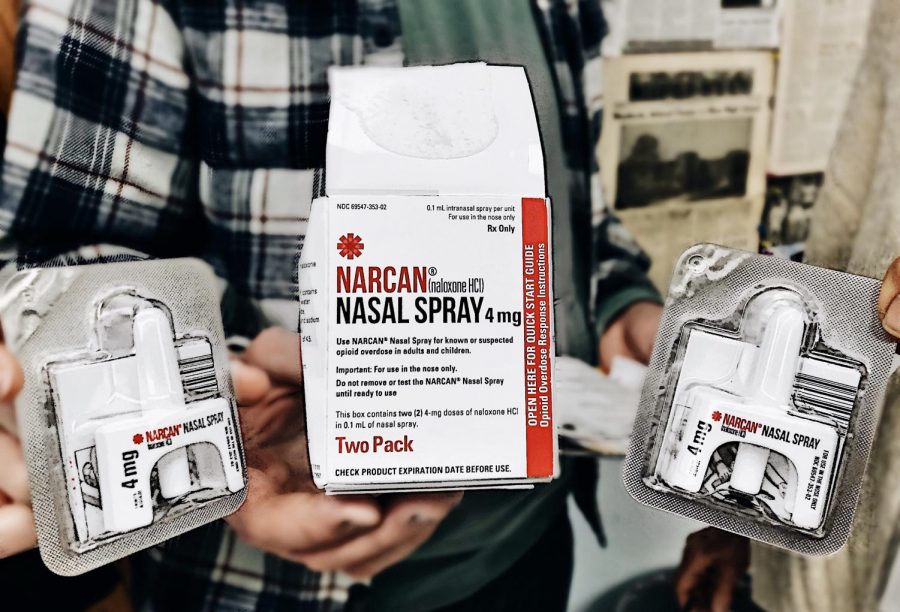New Narcan policies enacted
Photo Audrey Pucciarelli
Contents of a two-dose Narcan box at WHS
Westfield Police Chief Christopher Battiloro recently enrolled the Westfield Police Department in a program offered by the NJ Department of Health, which provides two doses of the drug Naloxone (Narcan) for each officer at no charge. “We have 61 officers in Westfield, and were able to acquire an individual two-pack dosage for every officer,” said Battiloro.
Each patrol car is equipped with Narcan, and the WPD is currently beginning to modify uniforms so the drug can be carried securely on officers at all times.
When someone overdoses on an opioid, their bodily functions are slowed down, which stops their breathing, leading to their death. However, Narcan works as an antidote. The drug, initially injected with a syringe, was first approved for use in 1971 by the FDA. In 2015, an intranasal spray was approved that allowed the drug to be administered anywhere.
According to Battiloro, in the past year, Narcan was administered five times to opioid overdose patients in Westfield. Each time, first responders were able to revive the individual.
The amount of overdoses in New Jersey has been increasing, and new policies are being placed in towns and schools. The nurses at WHS are now certified to respond to an opioid overdose. WHS Nurse Carole Stavitski said that after Rutgers received a grant and contacted her, “They trained every nurse in this district and every school in this district has a Narcan kit.” As of now, any high school nurse in New Jersey must be trained in administering Narcan.
WHS Nurse Robert Ripper said in a recent interview, “I think it would be a great thing for more people to be trained because you never know who’s going to be here in an emergency.”
According to the NJ Attorney General’s Office, an estimated 3,021 New Jerseyans died in 2019 as a result of a drug overdose; 129 of those deaths took place in Union County. According to a report produced by the NJ Department of Health, in 2017, Union County lost 131 individuals to drug overdoses. “This is a trend that we are seeing here, not just in Union County or Westfield, but nationally. I think the crisis is getting quite worse,” said Battiloro. “It can, it does and it has happened to people in Westfield… it’s a public safety concern that we have to be aware of.”
Although Stavitski is already trained, as per the policy, she is currently in the process of attempting to get more doses. However, before the mandate, Stavitski sought training for the use of Narcan at an open session hosted by the Ocean County Prosecutor’s Office a few years ago. Stavitiski told Hi’s Eye that the WHS nurses are permitted to give up to three doses in attempts to save a person who has overdosed.
In addition, WHS Health Teacher Susan Kolesar ensures Narcan is taught about in her health classes. “As soon as Narcan became available without a prescription, I started teaching about it,” said Kolesar. “We’ve had students, former students and parents that have succumbed to an opioid overdose or addiction. Opioids are something that people are given for pain, even after a wisdom tooth removal. Sometimes, someone can have an accidental overdose.”
Today, 80 percent of heroin seized within New Jersey by police tests positive for fentanyl. Fentanyl is a prescription pain medication that is 80 to 100 times stronger than morphine, according to the FDA. In 2016, the National Institutes of Health stated that, “synthetic opioid (primarily fentanyl) passes prescription opioids as the most common drugs involved in overdose deaths in the United States.”
The NJ Department of Health and Human Services has allotted over $1.5 million to help combat the opioid crisis within the state, giving $170,000 to Union County alone. In addition, more than 400 doses of Narcan were dispensed to public libraries across the state. Although the Westfield Memorial Library didn’t receive any Narcan, its librarians have shown interest in gaining access to Narcan.
“Last year in New Jersey, first responders administered Narcan more than 16,000 times, preventing thousands of deaths,” said NJ Attorney General Gurbir S. Grewal in a statement released by his office.
Narcan itself is fairly easy to use, which is helpful in a life-or-death situation. “It’s so easy. There’s nothing hard about it. You can’t hurt the person; there shouldn’t be any question about it,” said Stavitiski. “And even if you give it to a person who doesn’t need it, it doesn’t do anything to them that would hurt them.”
The opioid epidemic is one of the biggest problems facing New Jersey. The NJ Department of Health has made an impact that, hopefully, will decrease the number of drug-related deaths within the state.
In New Jersey, EMTs, police officers, nurses and some librarians are trained in administering Narcan. With these new policies put in place, Westfield citizens can hopefully begin to see the number of opioid overdose deaths decrease.
For confidential treatment referral, contact the Substance Abuse and Mental Health Services Administration at 1-800-662-4357.

